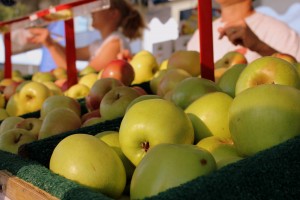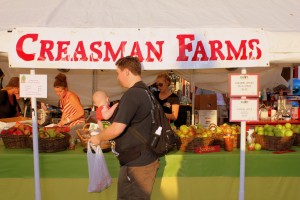The 67th annual NC Apple Festival began under cloudy skies on Friday, August 30. But a little threat of rain and thunderstorms all weekend wasn’t enough to deter people from packing both sides of the street, moving at a snail’s pace akin to rush hour on a Friday afternoon.
“The apple has been called the loveliest of all fruits. It is also one of the most important agricultural crops grown in Henderson County. During a normal year it brings in an average income of $22 million dollars or more. Growing apples has been part of Henderson County’s culture and heritage since the mid-1700s,” it states on the NC Apple Festival Website.
To be included in the Apple Festival, apple farmers must meet the requirements of the NC Apple Growers Association and, at this point, join the waiting list. The Apple Festival brings awareness to the community about local farmers and increases sales. With nearly 200 apple farmers, Henderson County is responsible for 65 percent of all apples grown in NC and, since NC is the seventh largest apple growing state in the country, it’s safe to say that apple farmers in Henderson County are busy.
Colby Creasman, a WCU senior and daughter of Henderson County apple farmers Dawn and Bobby Creasman, has attended and worked the Apple Festival with Creasman Farms for the past 14 years.
“To me, it’s like the biggest annual reunion of our community, and even though there are a lot of people who come from out of town, I get to see people I haven’t seen all year, like people from high school. I feel like this is one event [over] Labor Day weekend that people come home for. So it’s good to see old friends and old teachers, even family members I haven’t seen.”
Creasman Farms is a third generation farm in Henderson County and has been in business for nearly 80 years. Creasman’s great-grandfather founded the farm and she has grown up learning the hardships of running and owning an apple farm. Her great-grandfather row-cropped and farmed apples in Dana. When her grandfather took over he transitioned the farm to mostly apples. When her mother and father took over, they evolved a different kind of farming.
“At that time, most apple farmers were wholesale [which means] they grew a bunch of apples of a certain variety and they were loaded up on tractor trailers and sent to processing plants… but that’s when my parents realized a greater market for more income was the retail side,” she further explained.
When she was about five-years-old, her parents bought new land, sold the old farm and replanted the whole orchard with new varieties in order to market towards individuals instead of large companies. Trees have to be replanted every 12 to 15 years because, once a tree becomes so old, the fruit it bears is smaller than it could be and doesn’t grow in large quantities. Creasman farms now carries over 40 varieties of apples, including heirloom varieties such as Wolf River apples, June apples and Jonathan apples, as well as popular varieties such as Gala, Granny Smith and Fuji that the Creasman’s sell at multiple farmer’s markets across the region; including the Asheville City Market, Montford Farmer’s Market, Piedmont Farmer’s Market and the Black Mountain Tailgate Market.
Apple farming comes with a multitude of risks as many apple growers in Henderson County can attest to in the past couple years. To Creasman, farming is one of the biggest career risks. “You take a chance and invest a lot of money up front, [but] you never know what Mother Nature’s going to bring or what people are going to buy come harvest time… so you invest all this money and when it’s time to harvest and nobody buys your product, you’re left without money and a lot of produce you have to decide what to do with,” said Creasman.
Contrary to popular belief, not all apple farms are eligible for government funding. One of the major costs of farming is start-up, maintenance, and coverage if disaster strikes. However, if the farm is not a corporate farm, they may be left out in the cold. “The only people who can receive government funding are large corporate farmers who farm full time, 100 percent. So when a disaster strikes, and people say in news reports that they’re getting government funding to supplement what happened, [it may not necessarily be true for all farmers]. The last time my family actually received government funding was probably over 10 years ago… we’re just too small to be considered even though we grow a lot of stuff.”
Weather is another risk that apple farmers have to deal with each year.
“It’s been just as difficult [of a] growing season [as last year] because all the rain causes moisture to settle in the fields and moisture causes rot and bacteria, as well as mildew and mold growth on the fruit. When it rains so much, my dad can’t get into the orchard to keep it mowed, to keep the weeds down, he can’t spray the apples to prevent the mildew because it rains so much, and when he goes and sprays it just washes off with the rain. The rain has been a really big burden,” said Creasman.

The rainy weather this year was an obstacle to overcome before getting a good crop to the Apple Festival
Last year there was an early season freeze that nearly wiped out the entire harvest, and so much rain this season has affected the apples in negative ways. This year there has been so much rain that the apples haven’t been able to get sufficient sunlight to produce the sugars that make the apples sweet. With so much rain, and not enough sun, the resulting apples will be juicy but have a slightly less sweet taste. Rotting among the apples has been the biggest problem this year. The varieties that are picked mid-fall, however, should not be affected if the rains hold off.
Creasman Farms is hardly the only apple farm in Hendersonville, however. Other orchards include Grandad’s Apples, Justus Orchard, Lyda Farms, Ottanola Farms, JH Stepp Farm’s Hillcrest Orchard, and many more that can be found here. Many of the farms in Hendersonville offer tours and activities for families and visitors to enjoy. Grandad’s Apples is a 70-acre farm that boasts a five-acre corn maze, a farmyard animal petting zoo, the “cow train” to take a tour of the farm, a bakery and store, pumpkins, and, of course, fresh apples that you can buy already picked or head out in the orchards to pick for yourself. Most of the farms have expanded their selling opportunities by offering summer vegetables as well as apples.
Besides the fact that these orchards and farms offer opportunities to have fun, they permit people to get the experience of what it’s like to buy locally and support the local economy.
Ashley Snyder, WCU senior and produce stand worker in Mills River, North Carolina, has gained a better understanding of why it’s important to buy locally. “Growing up in a small town, where about 85 percent of the land is farmland, you get an understanding of what farmers go through. Since working at the produce stand, it has really opened my eyes on just how hard the farmers work to have an end result—hoping to end up in the positive when the crops come in. Since this summer has been very wet, it has been really tough on the farmers to barely break even.
I have always supported local farmers, but working at the produce stand makes me want to support them even more. I personally think that local food tastes better… you are getting the freshest produce, as compared to produce that has had to travel to the supermarkets, which means it is days older when the customer gets it… Local food also builds community. Knowing where your food comes from is a big plus for some people. When people buy from local farmers, their money goes back into the community and relationships are built between the farmer and the consumer.”
The Apple Festival has been an annual festival in Hendersonville for over 60 years now, so for over 60 years, people have been able to visit and enjoy not only homemade foods, crafts and a good time, but the taste of a fresh, crisp apple right from the tree.



